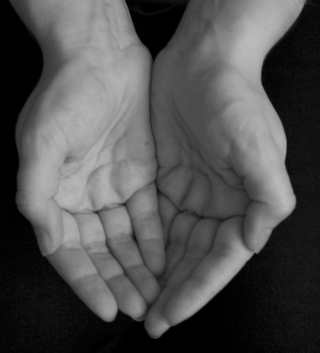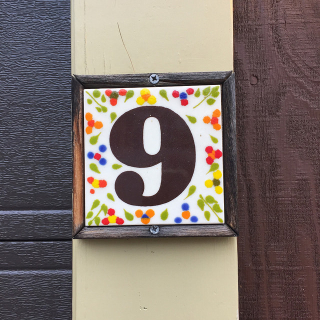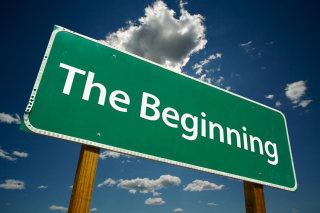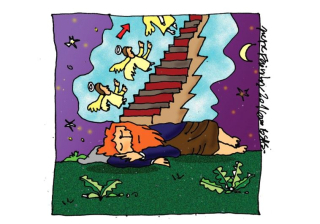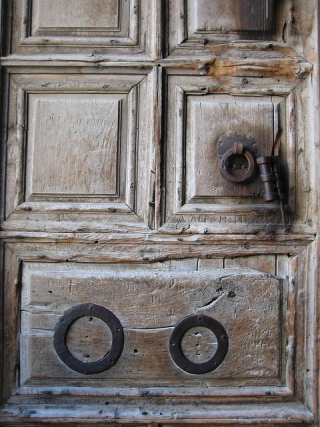Rachel Barenblat's Blog, page 96
November 9, 2016
On grief and moving forward
This morning I presided over a funeral for a beloved member of my congregation. It was hard to shake the sense that many of us were mourning not only that loss, but also the loss of a vision of our nation as a place of hope and inclusion. Even those who are happy with yesterday's outcome may be feeling shaken by the reminder of how stark are the divisions within our nation.
To everyone who is feeling grief today, I say: it is okay to feel how you are feeling. Whatever you are feeling, take permission to feel it. Let yourself grieve.
Take comfort in what you can: the presence of friends or family, whatever sweetness or kindness you can find, a cup of coffee, the fact that the sun rose this morning.
Recognize that grief comes and goes in its own rhythms. So, too, does healing. Be gentle with yourself today and in days to come. Be gentle with those you encounter.
When grief is strong, it can seem impossible to imagine that one will ever feel differently. But this is not all there is. Loss is not all there is. Grief is not all there is.
Jewish tradition wisely instructs mourners to retreat from the world for a week. The customs of shiva are designed to insulate mourners from the hard edges of the outside world. They remind us to take the time we need to tell stories, to remember, and to grieve.
At the end of shiva, there is a custom of leaving one's house through one door, walking around the block, and then entering the house through a different door. We will emerge from our grief changed by the experience of the grieving. We will exit what was and enter into something new.
In this week's Torah portion, Lech-Lecha, God calls Avram to leave his home and go forth into the place that God will show him. The opening words are often translated as "Go forth," but they can also be understood to mean "Go into yourself." Like Avram, we too are called to journey deep into ourselves, to dedicate ourselves to the spiritual work of becoming.
Avram had to leave everything that was familiar. He too must have felt that he had lost his narrative about who he thought he was and what he thought was ahead of him. But somehow he found the strength for the journey, and so will we.
We may need to grieve, but we must resist despair. Despair is corrosive, and it denies our agency and our ability to create change.
We can cultivate hope. We can build a better world. We owe it to ourselves and to those who will come after us to continue trying to build a world of justice and lovingkindness, a world in which no one need fear abuse or mistreatment, a world in which diversities of all kinds -- of race and creed and sexual orientation -- are honored and celebrated. A world in which the vulnerable are protected. A world in which bigotry and hatred vanish like smoke, and generosity of spirit and compassion prevail.
In this moment I don't know how we will do that. I don't know what steps we will take or how they will get us where we need to go. But I know that this is the journey to which we are called, and that we will journey together.
You may find comfort, as I did, in this from Rabbi David Evan Markus: The Day After.
Cross-posted to my congregational blog.

November 7, 2016
Prayers for voting
 I've shared these resources before, but they bear repeating, I think:
I've shared these resources before, but they bear repeating, I think:
A Prayer For Voting by Rabbi David Seidenberg
A Prayer For Voting by Rabbi Sami Barth
First Step: Lech Lecha -- a Torah poem written eight years ago on Election Day, when Election Day fell (as it does this year) during the week of parashat Lech Lecha
And here's an essay I haven't shared on this blog before (though those of you who follow me on Facebook may already have seen it): Vote Your Privilege by Rabbi David Evan Markus. He writes, "This year I'll cast my vote on behalf of... a politics worthy of everyone – whatever they look like, whomever they love, whether or however they pray." Amen v'amen.
May the results of tomorrow's elections in the United States bring us closer to a world of hope, justice, and opportunity for all.

November 6, 2016
Take care of yourself as Election Day approaches
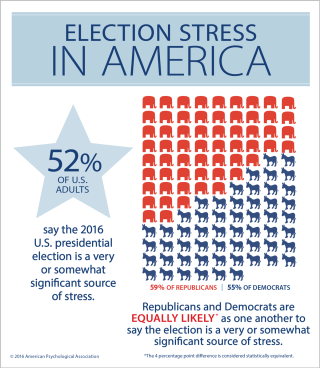 The American Psychological Association reports that the Presidential election is a source of "significant stress" for a majority of Americans. I'm not surprised to hear it. Everyone I know is surfing waves of anxiety right now. I don't ever remember an election where the choices seemed this stark, the rhetoric this toxic, and the nation this divided.
The American Psychological Association reports that the Presidential election is a source of "significant stress" for a majority of Americans. I'm not surprised to hear it. Everyone I know is surfing waves of anxiety right now. I don't ever remember an election where the choices seemed this stark, the rhetoric this toxic, and the nation this divided.
Anecdotal conversation with a colleague who works as a therapist yielded a report that she's never seen pre-election anxiety this dramatic in all her years of practice. If you are feeling anxious, stressed-out, and/or afraid of what may be coming, you are not alone.
Take care of yourself over these next few days.
For some of us self-care might mean pounding the pavement with get-out-the-vote initiatives, or making phone calls to potential voters. Taking action can be a way of asserting some control over a situation that otherwise feels vast and out of our hands, and that can be a form of self-care.
For others of us self-care might mean turning off the television, clicking away from Facebook and Twitter, and resisting the temptation to refresh Five Thirty Eight one more time. Self-care might involve choosing to diminish our intake of the 24-hour news cycle and the constant stream of data and opinions across social media networks.
Do what you need to do to take care of yourself. This goes doubly for those of us who are tasked with caring for others -- our children, our parents, our loved ones, our congregations. It is always okay to engage if that will help you through, and it is always okay to disengage if that's what you need to do. Listen to your body and to your heart, not just to your mind and the narratives your mind spins about what you "should" (or shouldn't) be doing with your time as the election approaches.
For me, self-care includes ensuring that I get enough rest, cooking foods that I will enjoy eating, pausing to articulate gratitude for being alive and for the food that I have to eat, seeking out small sources of beauty like the red leaves on the bush I can see from my home office window or the bright orange of the pumpkins at our door. Lately it also includes pausing for short stints of contemplative practice during which I recognize the anxiety that the election is provoking in me, and give myself permission to feel what I am feeling, and then gently tell the anxiety that it is not needed and do my best to let it go.
Most of all it means seeing myself through gentle eyes, and being kind to myself. May you find access to your best forms of self-care in the coming days.
Related:
How news and social media can hurt us, 2014
Salve, 2014

November 5, 2016
Safe from the storm: a d'var Torah for parashat Noach
This year as I read this week's Torah portion a three-word phrase leapt out at me. It comes after the part about how Noah built the ark, and all the animals that he collected inside it -- between all of those descriptions, and the Flood itself. ויסגור ה' בעדו: "And God shut him in."
Rashi notes that the literal meaning of this phrase is that God closed the door of the ark behind Noah, protecting him from the waters that would rage outside the door. The commentator known as the Radak writes that "God protected him against the chance of even a small hole opening in the ark as a result of the powerful rains." One way or another, this verse seems to be saying something about God protecting Noah and keeping him safe through the storm.
As the cold weather approaches, we -- like Noah -- batten down the hatches. Maybe we tinker with our storm windows, spray insulation into cracks and crevices, put an extra blanket on the bed. If that's true as we anticipate literal storms, how much more true as we anticiapte emotional and spiritual storms. Every life has periods of turbulent waters. As we face those waters, we yearn to be cared-for and tucked-in, to have God's presence securing and protecting us.
I'm not a sailor, but I know that when big storms arise sometimes the only way through is to lower sail and let the storm rage. Often storms move us to new places: as the winds and currents can move a boat into new waters, when emotional currents surge strong they may carry us to places we didn't expect. Authentic spiritual life asks us to weigh anchor and let ourselves be moved, trusting that even when external circumstances are swirling around us we can touch stillness and eternity.
One of the reasons to maintain spiritual practices when the sailing is smooth is so that those practices are there to sustain and protect us when storms pick up. If I remind myself every morning to pause to articulate gratitude for being alive, then maybe when the tough mornings come the habit will be engrained enough to carry me through. If I pause before sleep to try to let go of the day's mistakes and hurts, then maybe I can wake into the infinite possibility of the new day, even when sleep came on the heels of weeping.
How can we feel secured and protected, as Noah might have felt when God lovingly closed the door behind him? Maybe it's a phone call or a text message from a friend reminding us that we're not alone. Maybe it's reading an essay that makes us feel seen and understood in who we most deeply are. Maybe it's putting on a piece of jewelry that feels like a talisman. Maybe it's a session with a therapist who reminds us that our stories matter, or a spiritual director who companions us in our journeying.
Our liturgy tells us that we are loved by an unending love, an אהבת עולם. For me, the presence of that love is what secures the door and keeps me safe from the storm. Sometimes I catch a glimpse of that love in the love I feel for my child, or the love he feels for me. Sometimes I brush up against it in the connection between me and my most beloved friends. Sometimes I feel that love manifest in the extraordinary beauty of creation, in the rise of early morning light over our hills now dressed in November's muted palette or the calliope song of geese migrating overhead at dusk.
What makes you feel seen and cared-for? What carries you safely through life's storms?
This is the d'var Torah I offered at my shul this Shabbes. (Cross-posted to my From the Rabbi blog.)

November 1, 2016
Entering the empty month
Today and tomorrow are Rosh Chodesh, new moon, the "head of the month" -- the beginning of a new lunar month. On the Jewish calendar, we're entering into the month of Cheshvan. Cheshvan is remarkable because it is empty: aside from Shabbat, which comes every seventh day all year long, Cheshvan contains no holidays. No feast days, no fast days, no special practices, no special liturgy. Nothing at all out of the ordinary. Jewish time is separated into kodesh (holy / set-apart) and chol (ordinary time), and the month of Cheshvan is -- aside from its Shabbatot -- completely chol.
I love the Days of Awe. I love the whole rollercoaster: from the low point of Tisha b'Av, through the month of Elul (introspection, inner work, psalm 27), through Rosh Hashanah (day of judgement, birthday of creation), through the Ten Days of Teshuvah, through Yom Kippur (day of atonement, intimacy with God), through the seven days of Sukkot (little harvest house, lulav and etrog, facing impermanence) and Hoshana Rabbah and Shemini Atzeret and Simchat Torah. And by the time we get to the end of all of those special days, with their customs and practices and words, I am wiped out.
Enter Cheshvan, the empty month. On the solar calendar we are moving toward winter in this hemisphere. The days are getting colder, the leaves have largely blown off the trees, the hills are taking on their more sere and muted late-autumn hues of soft purples and browns beneath frequently clouded skies. The outside world feels like a reflection of my internal spiritual landscape. The time for the finery of the Days of Awe is over. Now I cup my hands around a mug of tea, now I sit and breathe deeply, now I let everything that was activated and stirred-up in me by the holidays begin to settle like fallen leaves.
Cheshvan is the beginning of a spiritual fallow season. Just as the earth needs time to rest between harvest and new planting, so too do our hearts and souls. Now we let the ordinary passage of ordinary time work its magic. We trust that the coming season will somehow -- alchemically, mysteriously -- transform the discoveries and emotions of the holiday season into the inner qualities we will most need as we approach the festivals of (northern hemisphere) spring in a few months. We are like fallen leaves not yet ready to serve as mulch for spring's new growth. We are like seeds curled tight, waiting.
We can't know yet what will arise in us after the quiet winter. If we had a telescope to let us look far out to the horizon we could maybe barely glimpse the beacons of Tu BiShvat, Purim, and Pesach in the distance. But there are months between now and then. In the northern hemisphere the days are growing shorter. It's Cheshvan, the empty month. Time to let our hands be empty, let our hearts be open, let the hard work of the holiday season begin to percolate in our hearts and souls. It's Cheshvan, the empty month. Time to hunker down, tend our internal fires, and let ordinary time balm our tender places.
Related:
Seasonal, 2013

October 31, 2016
Meet you at the Well for "An Evening of Song & Spirit(s)" on 11/19
If you're in or near Detroit, meet you at the Well on November 19?
The Well is an innovative community-building, education, and spirituality outreach program geared toward the needs of young adults and those who haven't connected with other more mainstream institutions. I've wanted to visit for a while, and I'm excited to have the opportunity to do so with my ALEPH co-chair Rabbi David Evan Markus and our friend and teacher Rabbi Elliot Ginsburg.
Rabbi Dan Horwitz has graciously invited us to be part of An Evening of Song and Spirit(s) beginning at 8pm on Saturday, November 19. We'll make havdalah and weave together an evening niggunim, stories, Hasidic teachings, and poetry. It will be yummy.
If you're interested in joining us, register at meetyouatthewell.org/song. Space is limited and tickets are $10/ person. Deep thanks to Rabbi Dan for inviting Rabbi David, Rabbi Elliot, and me to share teachings, songs, stories, and poetry at this havdalah event. Hope to see some of you there!

October 30, 2016
The woman who used to live at number 9
Sometimes I think about the woman who used to live in the condo that now is mine. I bought this condo from the grown children of a woman named Sally, who died at 91. I never knew her, though this is a small town, and I have encountered many people who did know her. "Oh, you bought Sally's place," they say. Usually after that, people say something like "she was quite a character."
I've heard anecdotes about her climbing over fences, playing golf with celebrities, enjoying a scotch before dinner. The house was empty when I moved in, but hidden in corners that her children had missed I found a few of her things. I kept the coffee mug emblazoned with the logo of the Clark Art Institute; I gave the long, wickedly elegant black and white cigarette holder to Goodwill.
I wonder what she would think about the fact that her home is now inhabited by a single mother and a first grader. Did she have kids when she lived here, or did she move here after her kids were grown? I wonder what she would think of the bright red curtains I hung in the living room, or the wine-colored duvet and pillows in the master bedroom once curtained with a print of pink and green.
In the kitchen I've hung photographs I took in Buenos Aires and in Jerusalem: did she like to travel? Had she ever been to either of those places? What would she make of the music that fills these rooms -- sometimes Nava Tehila, sometimes Nusrat Fateh Ali Khan, often the theme song to the Pokémon cartoons my son likes to watch? What would she have made of the sukkah I built on the mirpesset?
Sometimes I imagine her keeping company with the people whose furniture I have inherited. My ex-husband's maternal grandmother, for instance: her bedside tables are in my master bedroom now. Or my own maternal grandparents, whose Czech bookcase serves as a dining room sideboard. I imagine them as a friendly chorus of elders watching over me in this new chapter, fondly, from afar.

October 28, 2016
Back to the beginning
This week we begin again. The cycle of fall holidays is finally over: we have returned to ordinary time. I don't mean by that term precisely what my Christian cousins mean by it -- for them it has a more particular liturgical meaning than it does for us. What I mean is something more like חול / chol, non-sacred time. Usually we speak in terms of שבת וחול / shabbat v'chol, the holiness of Shabbat and the ordinariness of the non-sacred workweek. After the star-studded expanse of the Days of Awe and all that comes before and after them, this first ordinary Shabbat of the new year feels to me almost like a kind of chol. It will be Shabbat, of course, which makes it holy -- but it's a holiness that partakes of the regular rhythms of the year. The smaller ebb-and-flow of Shabbat-and-week, rather than the big peaks from which we have only recently descended. We have returned to normalcy.
As the parent of a first grader, I am conscious of the gifts that come with normalcy and routine. Transitions are hard. Big holidays are disruptions in ordinary time, and they need to be -- we need them to be. We need to be shaken out of our complacency. We need to be confronted with experiences that awaken our sense of awe and majesty, that remind us that we are mortal and today might be our last chance to lead the kind of life of which we can be proud because tomorrow is never guaranteed. Jewish tradition is wise in giving us these things, and in giving us so many of them in a row that our emotional and spiritual defenses weaken and let our true hearts begin to shine through. And after so many of them in a row, now we need the return to ordinary time. Just as my son needs to return to the regular rhythms of schoolnight bedtime, so we need to return to our regular rhythms too.
And what do we do on this first Shabbat of ordinary time? We begin our great story again. We roll our Torah scrolls back to the very beginning and we read about when God was beginning to create the heavens and the earth, and creation was wild and waste, and the spirit of the Divine hovered like a mother bird over the face of the waters. We return to the moment in our story when all of creation was as-yet untapped potential. At the beginning of the story, anything could happen! Of course, the words of our Torah are already written. We know how that story will go from here. But there's still power, for me, in returning to the narrative moment when everything began. It's a new beginning, a new year. The story in our scroll is already written, but what we will make of that story this year is up to us. What we will make of our lives this year is up to us. What we will revise ourselves into is up to us.

October 26, 2016
Waking up again - for People & The Book / The Jerusalem Report
How much of your life do you spend sleepwalking? How much of your life do you spend going through the motions, carried forward by force of habit rather than any particular consciousness or will? Most of us do this, much of the time.
I wake in the morning, make the kid breakfast, get us dressed, pack our lunches, see him safely onto the schoolbus, and go to work, glancing at emails and Facebook messages all the while. Your variation probably looks slightly different, but not that different. Morning routines followed by the workday, evening routines followed by sleep.
There are good reasons why human beings routinize daily acts. Otherwise we'd be paralyzed by possibility. But the danger of routine is that we stop noticing what's beautiful, or moving, or real. Our lives become cookbook recipes from which we never divagate. We forget to add the most critical ingredients: mindfulness and heart. We move through our lives asleep.
This week's Torah portion offers us a striking example of what it might look like to wake up. Jacob rests his head on a stone and dreams of a ladder rooted in the earth reaching up to the heavens, with angels ascending and descending upon it. (Ex. 28:12) He has an encounter with God and when he wakes he is shaken: "Surely God is in this place," he exclaims, "and I -- I did not know!" (Ex. 28:16)...
Those are the first few paragraphs of my latest essay / d'var Torah, written on next week's Torah portion, Vayetzei, for the "People & The Book" section of The Jerusalem Report.
Those who live in Jerusalem can pick up a print copy of the magazine; others can click through to read the column at The Jerusalem Post.

October 24, 2016
Through today's door
Either you will
go through this door
or you will not go through.
If you go through
there is always the risk
of remembering your name.
Things look at you doubly
and you must look back
and let them happen.
If you do not go through
it is possible
to live worthily
to maintain your attitudes
to hold your position
to die bravely
but much will blind you,
much will evade you,
at what cost who knows?
The door itself
makes no promises.
It is only a door.
Every moment is a doorway. Between where we've been, and where we're going. Between who we've been, and who we're becoming.
Jewish tradition offers us something to put on a doorway: a mezuzah.
A reminder to pause. A reminder that transitions can be made holy. A reminder to notice.
And what's inside a mezuzah? A reminder of the Oneness behind all things. A reminder of the importance of love, which accompanies us in all of our journeying.
Today we pause and touch a mezuzah in time. Behind us: every holiday we've just celebrated. Look back over your shoulder and see them stretching back in time: Sukkot, and before that Yom Kippur, and before that Rosh Hashanah, and before that Elul, and before that Tisha b'Av.
Ahead of us: a fallow period, a time to integrate whatever has arisen in us during the holiday season.
Today is Shemini Atzeret, a day for pausing, the silence after the chant. Today God beseeches us to linger a little longer: the seven days of Sukkot have ended, but God says, "won't you stay in the sukkah with Me one more day, beloveds?" And we do.
In Israel and on the Reform calendar, today is also Simchat Torah. We read the very end of the Torah, and we read the very beginning of the Torah. Torah is a mobius strip whose end brings us back to its beginning. Our lives are like this, too: the end of one chapter is the beginning of the next.
We stand on the threshold between what was, and what isn't yet.
May we be blessed as we go through this door.
With gratitude to the editors of Mishkan T'filah who put Adrienne Rich's beautiful poem "Prospective Immigrants, Take Note" at the start of the festival morning service.
Image: a wooden door at the Church of the Holy Sepulchre, Jerusalem.

Rachel Barenblat's Blog
- Rachel Barenblat's profile
- 6 followers



